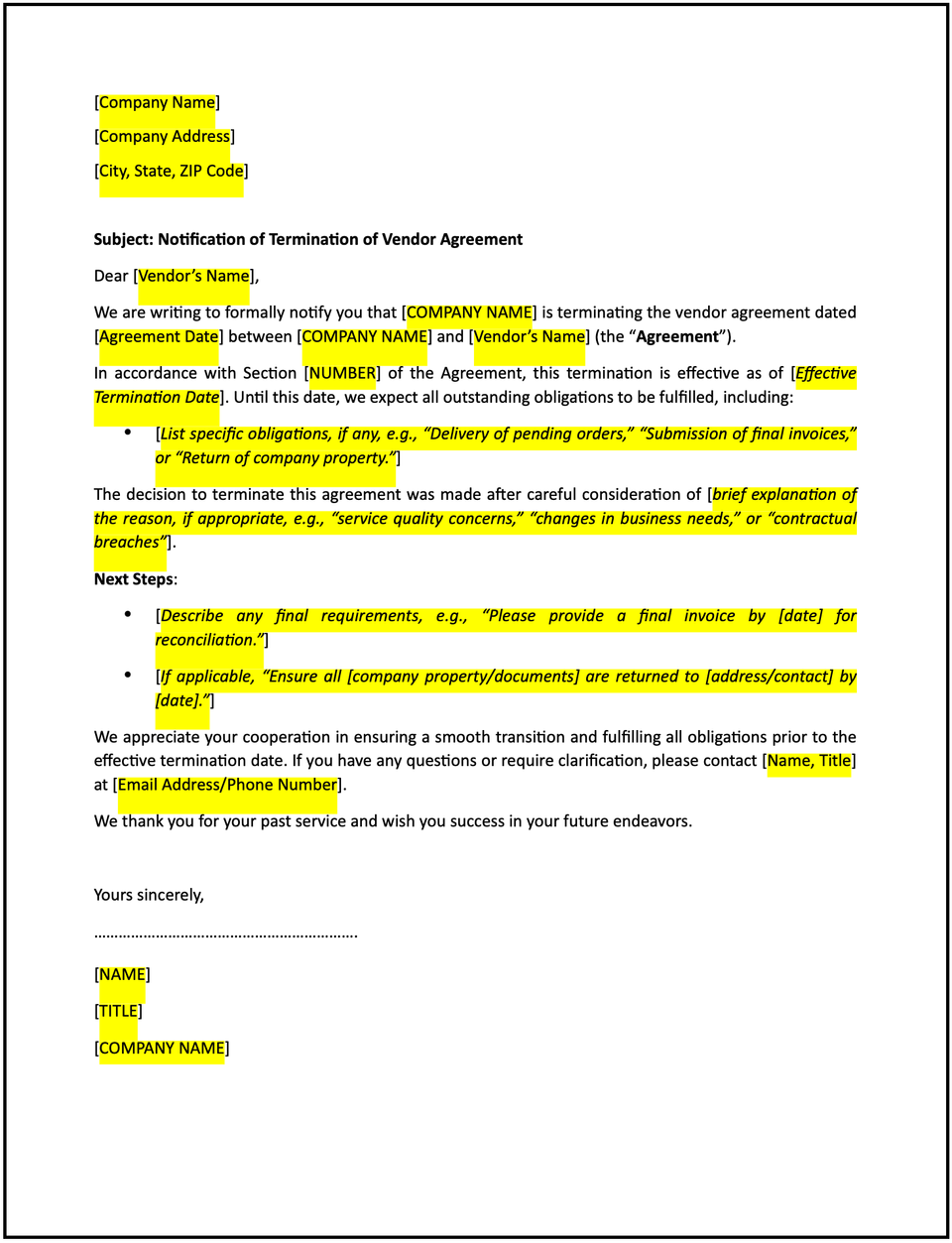Notification letter of termination of vendor agreement: Free template

Notification letter of termination of vendor agreement
A notification letter of termination of a vendor agreement is a formal communication used to inform a vendor that their services or contract will be terminated. This letter outlines the reasons for termination, the effective date, and any next steps or obligations to ensure a smooth transition.
How to use this notification letter of termination of vendor agreement
- Open with an introduction: Address the vendor respectfully and reference the specific agreement or contract being terminated.
- State the purpose: Clearly communicate that the agreement will be terminated and specify the effective date.
- Provide reasons: Briefly explain the rationale for the termination, such as non-compliance, performance issues, or a change in business needs.
- Outline next steps: Specify any final obligations, such as outstanding payments, return of assets, or the timeline for completing transitional activities.
- Emphasize professionalism: Reaffirm your intent to handle the termination process respectfully and in accordance with the terms of the agreement.
- Maintain a professional tone: Ensure the letter is clear, respectful, and focused on ensuring a smooth transition.
- Provide contact information: Include details for the recipient to reach out with questions or to discuss the termination further.
Benefits of using a notification letter of termination of vendor agreement
This letter ensures a structured and professional way to communicate contract termination while maintaining transparency and minimizing disputes. Here’s how it helps:
- Promotes clarity: Clearly explaining the termination prevents misunderstandings and confusion.
- Reflects professionalism: A well-crafted letter demonstrates respect and attention to detail.
- Encourages alignment: Outlining next steps ensures all parties understand their obligations.
- Builds trust: Handling terminations transparently reinforces a reputation for fairness.
- Minimizes disruptions: Timely communication supports a smooth transition and limits operational impacts.
Tips for writing an effective notification letter of termination of vendor agreement
- Be specific: Clearly reference the agreement and provide a brief explanation for the termination.
- Use professional language: Maintain a respectful and constructive tone to foster a professional relationship.
- Provide context: Briefly explain the reasons for termination and its necessity.
- Highlight mutual respect: Acknowledge the vendor’s contributions and express appreciation for their efforts.
- Include actionable steps: Share instructions for fulfilling final obligations and completing the transition.
- Keep it concise: Focus on the essential points while ensuring the tone is professional and respectful.
Frequently asked questions (FAQs)
Q: What details should I include in this letter?
A: Include references to the agreement, reasons for termination, effective date, and next steps.
Q: Should I personalize the letter?
A: Yes, addressing the vendor by name and referencing specific details demonstrates attentiveness and professionalism.
Q: Who typically sends this letter?
A: Procurement teams, legal teams, or business owners typically send this letter.
Q: How formal should this letter be?
A: The tone should be professional, respectful, and focused on fostering a smooth transition.
Q: When should this letter be sent?
A: Send the letter promptly after deciding on termination, allowing sufficient notice as outlined in the agreement.
Q: Can this letter include compensation or settlements?
A: Yes, if applicable, briefly mentioning final payments or settlements provides clarity.
Q: Is acknowledgment from the recipient required?
A: While not mandatory, requesting acknowledgment ensures the vendor is aware of the termination and its details.
This article contains general legal information and does not contain legal advice. Cobrief is not a law firm or a substitute for an attorney or law firm. The law is complex and changes often. For legal advice, please ask a lawyer.


